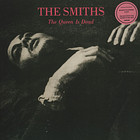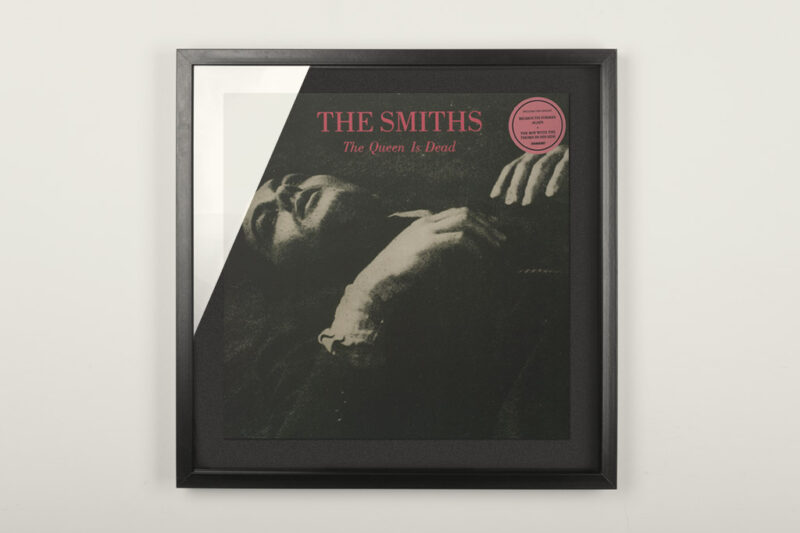The Queen is not dead, but The Smiths are. While Elizabeth II currently outlives her husband, the Manchester band could not stand it together for more than a few years. But that’s all it takes – within five years and four albums they managed to leave their mark in music history. Possibly one of the most formative indie albums is their third effort »The Queen is Dead«, released in 1986. Then as now, the band’s name is almost synonymous with its lead singer Morrissey. Recently outraged by a satire of himself in an episode of The Simpsons or with more than questionable attitudes towards Britain’s migration policy, the Briton repeatedly makes headlines. This is nothing new. Even before the release of »The Queen is Dead«, he publicly denounced the music industry and even his own label, Rough Trade, for not caring enough about the band. And let’s not forget their previous album was called »Meat is Murder«, a title clearly chosen to provoke. Then, as now, Morrissey knows very well: His wit is his greatest strength.
The Smiths dissect English society from the viewpoint of the average man lost in romantic relationships and angry at the political leadership and traditionalism. Morrissey’s lyrical extravagance transforms this perspective into scenarios in which, as in the title track, he describes the Queen as »Lowness« (as opposed to the formal »Your Royal Highness«) and rants against the royal family. Lyrically, the band lets out their frustration with the dusty English society and Margaret Thatcher’s neoliberal style of government in the 1980s. And the juicier the choice of subject, the more Morrissey lets his bitter sarcasm peek out in his songwriting. On the same track he draws the picture of Prince Charles in his mother’s wedding veil, surely fully aware of its humorous effect. The band’s black humor comes to light not least in songs like »Vicar in a Tutu« or »Some Girls Are Bigger Than Others«. Dripping with irony, Morrissey sings about the socially distorted notion of female bodies to an innocently sweet jangle-pop melody.
Provocations are thrown around, heartbreak must be wallowed in, and love is something you throw yourself into completely. Politically and emotionally provocative, so much so that a smirk may escape you at any given point, Morrissey presents himself as Indie-rock’s ever so misunderstood sad-boy.
And even when The Smiths enter the realms of feelings, there are no meek words, no supposedly neutral standing in between – no matter the topic, The Smiths are all in. Provocations are thrown around, heartbreak must be wallowed in, and love is something you throw yourself into completely. Politically and emotionally provocative, so much so that a smirk may escape you at any given point, Morrissey presents himself as Indie-rock’s ever so misunderstood sad-boy. With a chronically broken heart and a plaintive undertone, he dedicates »I Know It’s Over« to a failed love affair that hurts just as much as being buried alive. Morrissey’s lamenting voice, with which he stretches the vowels particularly long, paired with a swaying bass and stale drums exude such an intense sense of drama that irony resonates from it simultaneously. The Smiths’ love songs exude something transfigured, love is highly romanticized, and the rose-colored glasses evoke a strong theatricality that also comes to the fore in »There Is A Light That Never Goes Out«. Nowadays the track would certainly be decried as a toxic relationship, in which Morrissey’s infatuation and simultaneous social isolation are expressed in such a way that even the thought of dying in an accident with his beloved gives him pleasure. Morrissey wallows in heartbreak, so absorbed in it that it feels like it gives him (and certainly the listeners) a masochistic delight.
Morrissey’s lyrical provocations are cushioned by the instrumentation, especially by Johnny Marr’s guitar playing. He plays every melody in such a fluffy manner: His echoing chords just fly around, and the arpeggios prance elegantly. Bassist Andy Rourke and drummer Mike Joyce also turn almost every song into a potential radio hit. Again, the title track is the best example. On the track drums roll in a circular motion and the wah effects of Marr’s guitar create an overturning and therefore all the more driving melody. The dreamy play with elements of post-punk, alternative rock and jangle-pop transforms »The Queen is Dead« into a dense and surprisingly harmonious flood of sound in spite of the lyrical prickling. And what is left of it after 35 years? The Queen is still alive, you survived that break-up despite the world colliding over your head, but even after all this time the Smiths Opus Magnum still sound sounds refreshingly idiosyncratic.










